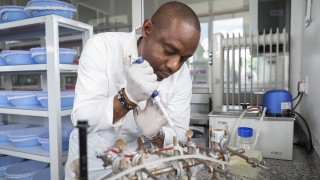Malaria is a hidden frontline in preparing for the next pandemic
Our new report delivers an important message: failure to invest in the fight against malaria is not just a setback for one disease — it is a risk to global health security.
Malaria has long been one of the world’s deadliest diseases, but its wider impact on preparing for and responding to pandemics is now becoming clearer.
Despite big gains over the past two decades, malaria still kills a child every minute. And according to new modelling data, the world stands at a crossroads. If international support — particularly funding for the Global Fund to Fight AIDS, Tuberculosis and Malaria — drops, malaria could come back stronger undoing years of progress by 2030.
This new report makes it clear: this is not just a humanitarian concern. A malaria resurgence would weaken health systems and make it harder to fight future pandemics. When malaria spreads unchecked, it strains frontline health services, risks overwhelming testing systems, and makes it harder to spot other and emerging dangerous diseases.
Nowhere is this danger more evident than in sub-Saharan Africa, where a third of all fevers still go undiagnosed. Malaria’s symptoms - fever, chills, fatigue - are shared by countless other infections. When so many fevers go unexplained, the potential for a new, deadly virus to spread undetected can grow exponentially.

The report warns that these undiagnosed cases could be masking the early signs of the next pandemic.
Yet amid the warning signs there is a clear path forward. Decades of malaria investment have helped build stronger health systems that now protect us all from future health emergencies.
From disease tracking to better testing, from local manufacturing to rapid vaccine rollout, the infrastructure built for malaria has already proven its value in pandemic response. The COVID-19 vaccine effort, for example, was accelerated by platforms and partnerships originally developed for malaria research. These gains should not be viewed in isolation, they are crucial for fighting future pandemics too.
The report shows that how we fight malaria can guide us in stopping future pandemics. But this progress is fragile, without steady investment and support, it could fall apart.
With major global health funding decisions coming in 2025, this report urges world leaders to invest more in fighting malaria – not just to end the disease but to prevent the next outbreak. That means recommitting to institutions like the Global Fund and Gavi, and unlocking climate finance to tackle the growing risks posed by warming temperatures on disease spread.
Malaria may not be the next pandemic, but how we fight it will determine whether we’re ready when the next one arrives.






